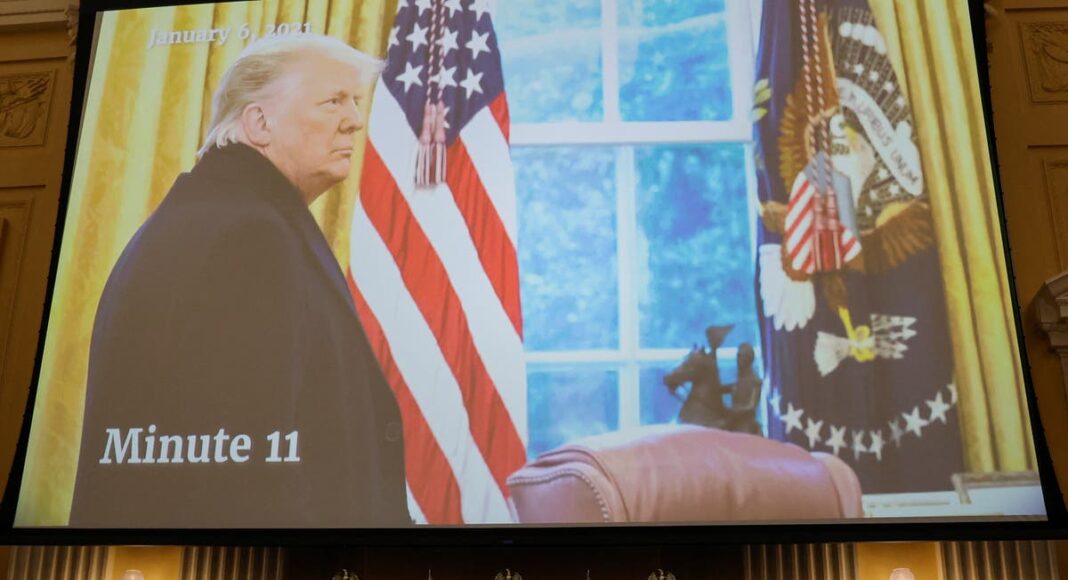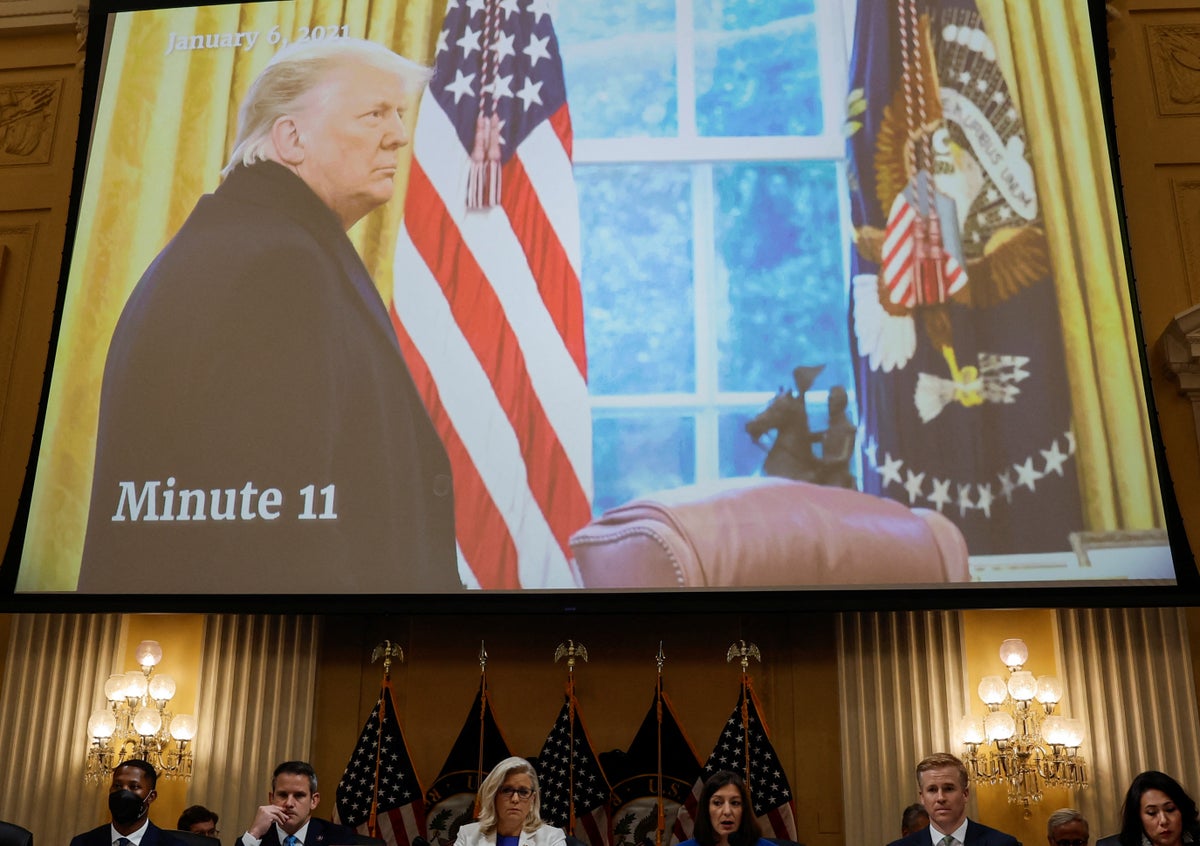It is hard to imagine that Donald Trump takes any pleasure from watching the January 6 committee hearings.
In fact, we know he does not. Every time congressman Bennie Thompson calls to order the select committee investigating the January 6 attack on the US Capitol, the former president is quick to complain about something. Usually, he alleges that witnesses are lying. One time, he accused the committee of ignoring him.
But if there is one thing the 76-year-old – whose journey into politics was presaged and helped by his time as a reality television star – might approve of, it is the sheer drama these hearings have contained.
Many have likened the proceedings to a soap opera or a TV thriller, or a version of the ratings-busting reality television specials Trump once starred in, albeit without anyone pretending to be a successful tycoon.
For millions of Americans, they have become genuine must-watch events, and fully deserving of their primetime presentation.
It was not always thus. Though these hearings – which only started six weeks ago, with a preliminary hearing to hear testimony from police officers having taken place last summer – have preoccupied the political class and some ordinary voters alike, it is hard to imagine ever going back to how they used to be done.
It is easy to forget, but until now, for as long as congressional hearings have been held, the format and style of presentation have been stuck in time.
People remember the dramatic highlights of events such as 1987’s Iran-Contra hearings, with Oliver North declaring: “I haven’t, in the 23 years that I have been in the uniformed services of the United States of America, ever violated an order – not one.”
Or they recall the claim made in 1994 by Thomas Sandefur, CEO of the Brown and Williamson tobacco company, who said: “I do not believe nicotine is addictive.”
The former president had to rehearse his speech several times before it could be broadcast
(Jan 6 Committee)
Likewise, some can remember the headlines of the 2005 hearing into the use of steroids in professional baseball, and a tearful Mark McGwire of the Oakland Athletics taking the fifth amendment and asking not to say anything that could incriminate him.
Yet, what we often forget is how long and drawn out many of these hearings were. The investigation into the 2012 attack on a US diplomatic compound in Benghazi dragged on for two years, with the then secretary of state Hillary Clinton testifying for more than 11 hours (the report found no wrongdoing on her part).
The 1973 hearings into Watergate spanned 13 months.
By contrast, the January 6 hearings have been parcelled into just a few hours, all of them chock full of new highlights and headline-generating revelations.
“January 6 was the culmination of an attempted coup: a brazen attempt, as one rioter put it shortly after January 6, to overthrow the government,” Thompson declared on the night of the first hearing on 9 June, an event that revealed previously unseen footage of the attack on the Capitol.
Jan 6 committee chairman Bennie Thompson.
(AP)
One reason for this dramatic new approach was that the committee had hired a television professional to help in its presentation.
James Goldston, the former president of ABC News, was approached and asked to oversee the presentation of the hearings to maximise impact. They needed to be serious but snappy, with plenty of viral moments people would share on social media.
They also needed to tell a story that people understood – that the attack was not just on the US Capitol, but on America’s democracy itself. They needed a villain, too, and course they had one in Trump.
“If Dr Eastman and President Trump’s plan had worked, it would have permanently ended the peaceful transition of power, undermining American democracy and the constitution,” Republican congresswoman Liz Cheney said after a hearing that examined the role of right-wing, fringe law professor John Eastman, who found himself in the Oval Office when many had given up on Trump, trying to persuade him that by misreading the 14th amendment of the constitution, they could appoint their open electors – if only Mike Pence would agree to play along.
Jan 6 committee vice-chair Liz Cheney
(AP)
Many have commented on how impressive Cheney has been in front of the cameras. Fluent and confident, she has frequently waited until the final moment of an episode or a hearing to reveal more staggering information – such as the fact that Trump’s chief of staff Mark Meadows had sought a pardon.
She also presented cliffhangers, nuggets to lure viewers back, such as the fact that Trump had allegedly sought to contact a witness before they had testified. Who could afford not to tune in next time?
If there is a villain, there need to be heroes, and there have been plenty of them – the courage of the US Capitol police officers, the simple decency of Republican officials in places such as Georgia who refused to bend to Trump’s request to “find another 11,000 votes”, the calm testimony of people such as Cassidy Hutchinson, whose descriptions of Trump’s plate-hurling rage were all the more powerful for there being no footage, just our own imaginations.
During the eighth hearing, the last until the committee reconvenes in September for more presentations, a photograph was shown of Trump, who at the time it was taken had just returned from the area close to the Washington park where he had made a fiery speech. Within a quarter of an hour, he knew what was happening.
“Within 15 minutes of leaving the stage, President Trump knew that the Capitol was besieged and under attack,” said committee member congresswoman Elaine Luria.
Some have said that people such as Kevin McCarthy erred by choosing not to partake in the hearings, meaning there were no Republicans to push back or press witnesses whose words were harmful to the president, with just Cheney and Adam Kinzinger representing the party, and both of them determined to get to the bottom of things rather than help Trump.
Jan 6 committee member Adam Kinzinger
(AP)
But even if they had been there, they might have struggled to really change the narrative.
But even if they had been there, they might have struggled to really change the narrative.
A good show – as Trump knows – needs good material, and the committee has had it in spades, not least the allegation that the president, rebuffed in his desire to go to Capitol Hill, lunged for the wheel of his SUV, shouting: “I’m the f***ing president.”
We do not yet know what the full impact of the hearings will be.
We do know that Trump is more vulnerable now, not simply to the prospect of criminal prosecution, but to a primary challenge from someone such as Rick DeSantis.
Republican pollster Sarah Longwell told The Independent that in the focus groups she has been conducting, voters are saying they are ready to move on from Trump to someone without all the baggage and noise.
A poll published by Reuters on the morning of Thursday’s hearing found that 40 per cent of Republicans now believe Trump is at least partly to blame for the deadly riot, up from 33 per cent in a similar poll conducted six weeks ago. While Trump continues to have widespread support in the party, a third of Republican respondents think he should not run for president again.
One thing we know for sure is that it will be very hard to go back to congressional inquiries as they were before this. These were hearings that asked for our prime attention, and very much earned it.
Just ask yourself this: Would you want to miss the next one?




